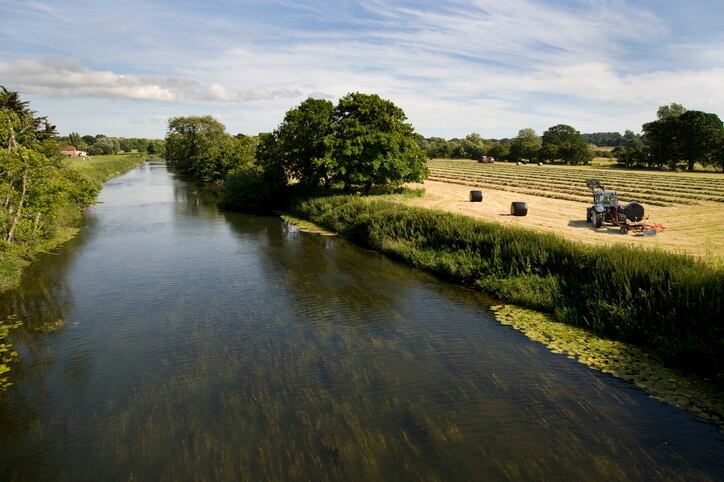Amid all the political hubbub in Westminster this week, as current UK PM Boris Johnson struggled to keep his head above the rising tide of ‘partygate’, the Cabinet Office snuck out a policy paper with surprisingly little fanfare.
‘The benefits of Brexit: How the UK is taking advantage of leaving the EU’ is a 102-page paper that seeks to highlight how the current administration is working to unshackle the UK from the European Union, so the country can ‘achieve great things’, in the Prime Minister’s words. The White Paper, Johnson wrote, sets out how the country will go about doing this.
His aims, he said, are: “Untangling ourselves from 40 years of EU membership, keeping what works, changing what doesn’t, supporting new industries, reinvigorating older ones and firmly planting the British flag on the world stage once again.”
A section of the document is dedicated to the food and drink sector, an industry that by almost any account has been battered by Brexit. According to the latest Food and Drink Federation figures, released late last year, UK exports of food and drink are down £2.7bn (-15.9%) in the first three quarters of 2021 compared to pre-pandemic levels. This is largely due to a drop in sales to the EU of £2.4bn (-23.7%) resulting from new barriers to trade with the EU and the ongoing effects of the COVID-19 pandemic.
So, what future does the Cabinet Office foresee for British food and farming?
The chapter dedicated to the industry describes a ‘highly resilient’ sector. “The events of the last two years have taught us how much domestic food production matters and shown that we have a highly resilient food supply chain,” it stated (never mind the fact that around 80% of the food Britain eats is imported).
In the future, we are promised a focus on (probably world-beating) food and drink innovation. “We will do more to ensure the UK is at the forefront of food innovation globally, giving consumers the choice and ability to consume more sustainable proteins that align with their values, while also supporting our net zero ambitions and strengthening the UK’s food security.”

Can Brexit boost innovation? Novel food regulations in firing line
Putting aside the arguments from the farming lobby that trade deals allowing imports of food produced to lower standards will undercut British farming, food safety and animal welfare, how does the Government intend to deliver?
All will be revealed when it publishes the Food Strategy White Paper, the Benefits of Brexit paper noted.
Amid reports (first noted in The Times) that Johnson could be preparing to backpedal on restrictions to HFSS promotions (due to come into force later this year) in order to appease Conservative backbenchers still fuming over revelations that parties were held at Number 10 in breach of lockdown rules, the Brexit policy document stated the Food White Paper “will set out how we will empower people, wherever they are, to make healthy and sustainable food choices.
"We will look at optimising food information, such as that on labelling, so consumers are better able to make informed choices. We want to see the agri-food sector go from strength to strength and ensure that the food system provides choice and access to high-quality, nutritious food for all. Along with the plans outlined the Government's obesity strategy, this work means we will go further and faster to support healthier diets and tackle the obesity crisis that has become all too apparent in recent years.
"We will always support our agri-food sector and we will never compromise on our high environmental, food-safety and welfare standards. We want people around the world to be lining up to buy British. With an independent trade policy, we will support our sectors to make the most of opportunities around the world."
While the Paper is thin on policy detail, it does give some indication of the direction of travel the UK government intends to take in food and drink.
This includes making the most of the UK's 'cutting edge' research and innovation capabilities and 'world-leading' (it had to be in there) science infrastructure. "We will do even more to coordinate research and innovation priorities across research councils, government, industry and consumers; pull through our research and development to real life application; and draw global investment to the UK."
Unleashing Britain's R&I might, the White Paper suggests, could well be linked to an adjustment of the Novel Food rules, which were duplicated from the European Union with responsibility for implementation simply handed off to the Food Standards Agency.
"We will use the freedom Brexit gives us to review our novel foods regulatory framework. This will include working with the Food Standards Agency to update the process for approving novel foods, to create a transparent and effective system that is the best in the world for innovators, investors and consumers and encourages safe innovation in the sustainable protein sector."
Brexit and food: Anything more costs and red tape?

But for many in the food industry, this will seem like little more than hot air. Because if you ask food businesses what Brexit is delivering for them, the answer will almost universally come back: extra costs and more red tape.
At the beginning of 2021, the British Meat Processors Association (BMPA) estimated the extra cost to the meat industry of Brexit bureaucracy would be between £90-£120 million a year. The industry body predicted it would render British exporters less competitive and cause a permanent 20% loss of trade with the EU.
Figures trickling out into the public domain would suggest these estimates are not overblown. According to the Animal and Plant Health Agency - which is responsible for just one part of the extra bureaucracy - the bill for Export Health Certificates (EHCs) that are now required to ship all products of animal origin comes to just shy of £60 million a year. That reflects a 1,255% increase year-on-year.
But the BMPA said that’s just the start. EHCs will only get goods onto a lorry. There are now ‘numerous new costs and overheads that previously didn’t exist’, like extra administrative staff, additional paperwork, record keeping and systems to support the issuing of EHCs, port charges, customs agents’ fees… the list goes on.
The BMPA revealed costs vary between companies, but all have reported a significant increase. Those same companies are also reporting a persistent loss of trade with the EU around the predicted 20%.
“After a year of dealing with the new post-Brexit customs and certification system, our members are reporting a huge rise in cost, which either has to be absorbed or passed on to their EU customers, rendering British exporters less competitive,” explained BMPA CEO Nick Allen.
“Millions of pounds are being spent on extra paperwork and checks, but for zero extra benefit to British companies. The Government could solve this problem by entering into a Veterinary Agreement with the EU which would instantly negate the need for most of the current bureaucracy and physical border checks and give British exporters a fighting chance to regain the trade they’ve lost - trade that simply can’t be replaced by selling goods to more distant markets.”
UK food inflation could be further hit by Brexit

The cost of living crisis is already a major issue for UK consumers. Figures out this week from the British Retail Consortium reveal food prices increased 2.7% in January, up from inflation of 2.4% the previous month and the highest rate seen since October 2013.
“Food prices continue to rise, especially domestic produce which have been impacted by poor harvests, labour shortages, and rising global food prices,” BRC chief executive Helen Dickinson noted.
UK shoppers might want to buckle up because Brexit could be about to make this trend even more pronounced, the BMPA warned.
This is because the rising cost of doing business with the EU – which is having such a negative impact on British exporters – is about to impact European imports, who currently supply over one-quarter of the food on British shelves.
“Until now, the Government has taken the decision to wave through supplies into the UK without requiring the same paperwork and physical checks. But from July, the same extra time and cost burdens to get through customs will be imposed on our EU suppliers. This means that EU imports will suddenly become more expensive, and European exporters will become less inclined to keep supplying to the UK,” the association warned.
“When you consider that over a quarter of all food on British shelves is sourced from the EU, these new costs imposed by Brexit will only add to the UK’s cost of living woes. The new post-Brexit trading regime has added millions in extra cost but provided zero benefit to companies; and it’s consumers that will be picking up the bill.”




